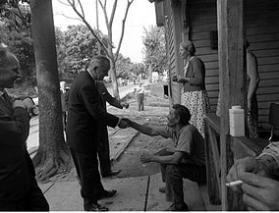It’s that time of year…long, chilly December evenings seem to be meant for movie watching. Before you settle down with your popcorn and hot coffee/tea/chocolate, please take a look at this list of twelve inspiring, food-for-thought, movies to watch for messages of love, peace, and hope to carry with you through this season and beyond. The films were chosen because of their contemplative nature, and the thoughtful messages these films offer for any of our lives.
A note from the author: In compiling this list of inspiring films for December, I realized that the dearth of films celebrating faith traditions other than Christianity here in the United States is glaringly – and painfully – obvious. The void is everyone’s loss since films are instructive for us all, and help us all break down our barriers as we learn more about each other. Two films that warrant a look to help us engage in good conversation together include Fiddler on the Roof (1971) and Fordson: Faith, Fasting, Football (2011). Fiddler on the Roof is a film adaptation of the stage musical of the same name, and tells the historically fictional story of a Jewish working-class family in the Ukrainian village of Anatevka before the village’s Jewish citizens are forced out; the storyline examines not only the socio-political issues of exile and emigration, but also a community’s re-examination of its religious traditions. Fordson is a documentary that steps inside a Dearborn, Michigan high school which has largely become Arab-American – and follows the school’s football team as it meets a cross-town rival during the last ten days of the Ramadan fast. Both films are eye-opening and instructive to persons of differing faith traditions.
As for the twelve inspiring films chosen for this review, links to trailers for most are included, as are a couple of complementary commentaries to help broaden perspective. And, while Christmas is the holiday around which all except one are centered, the messages of the films extend well beyond that celebration. So grab that popcorn and a hot beverage, and enjoy!
12. Christmas with the Kranks (2004)
Surprised that this book-turned-movie would make a list of inspiring films? John Grisham’s story (Skipping Christmas) invites us to consider what it means to “skip Christmas” in favor of other activities. When the Kranks’ daughter announces she’ll spend Christmas abroad, the parents decide to skip Christmas – and all of the decorating and feasting – and instead go on a cruise. The Kranks’ neighbors are clearly not accepting of their plans – and their daughter’s last-minute decision to come home for the holiday means that the Kranks have only hours to make Christmas happen. What do they – and viewers – learn about what celebrating Christmas really means?
11. The Bells of St. Mary’s (1945)
No, it’s not about Christmas – not at all. But this 1945 Bing Crosby classic is about faith, believing, and giving – generously sharing. What’s not to love about a film which includes a singing priest, a nun who teaches tremendous lessons about standing up for oneself, a little girl whose hopes become reality, and a hardened businessman who realizes that the best gift he can give to his community is a new school building for a struggling inner-city school?!
10. Miracle on 34thStreet (1947)
Can it be that a delightful gentleman who brings joy to everyone around him could truly be Santa? Kris Kringle takes on the role of Santa for Macy’s, and claims to be Santa himself. As unexplained things begin to happen, everyone wonders how he’s keeping up such a hoax – and a little girl whose wish comes true teaches the adults around her the lesson that “faith is believing in something when common sense tells you not to.”
9. The Family Man (2000)
In a bit of a reverse play on Frank Capra’s It’s a Wonderful Life – and definitely with a nod to themes of Charles Dickens’ A Christmas Carol – Nicholas Cage’s character, Jack Campbell, has found tremendous success in the business world, but at the cost of a relationship that had once been very meaningful to him. With a Christmas Day closing on a multibillion-dollar business deal on the table, Jack is given a glimpse into how extraordinary his ordinary life could have been had he stayed with his love, Kate Reynolds – and he slowly comes to realize that love and family are more important than all the success he craved.
8. The Homecoming (1971)
In the 1971 made-for-television film that becomes the prequel to the long-running series, The Waltons, viewers meet a family making home and life on a mountain in a post-Great Depression era Virginia. John Walton has taken a job in a neighboring town to generate more income for his family. Everyone is awaiting his arrival on Christmas Eve when his wife, Olivia, hears on the radio that a bus has overturned on the snow-and-ice-covered road leading home – and she fears that John may have been injured or killed. Swallowing her own pride – and what she knows to be John’s pride – she is forced to accept help from neighbors as she prays for John’s return. When John does make it home to his grateful and loving family, he comes not only bearing gifts that show the depth of his love for all of his family but also having reaffirmed his priorities.
7. Joyeux Noel (2005)
In early December 2014, Pope Benedict had implored the nations at war in World War I to call a truce on Christmas to acknowledge that holy day. While his plea was not officially recognized, the miracle of that Christmas was that a truce reportedly arose spontaneously among as many as 100,000 troops. Letters and other accounts from soldiers documented that, at places along the western front in the early hours of Christmas morning, the sounds of gunfire gave way to the sounds of Christmas carols rising over the trenches. As the Allied troops and the troops of the Central Forces sang carols in their native languages, they realized they were singing the same carols, and began singing together. Fears and suspicions began to drop as the men emerged from the trenches, unarmed, exchanging their meager rations with one another as gifts and reportedly even engaging in friendly soccer matches. The truce was a short-lived and not-to-be-repeated gift in a war that would take over 17 million lives. This critically-acclaimed film released in 2005 tells the story and begs a question about why peace can’t be lasting. For an essay on the truce and peace amid the warring storm, see A Christmas Truce in the Midst of War .
6. A Christmas Carol (1938)
The 1938 original film adaptation of Charles Dickens tale tells the story of a hardened and miserly businessman, Ebenezer Scrooge, who doesn’t celebrate Christmas and isn’t terribly concerned about the well-being of neighbors and his employee, Bob Cratchit. The character’s name – Scrooge – has become almost synonymous in modern culture with greed and self-centeredness. It’s only after Scrooge is visited by the ghostly visions of his deceased business partner and the spirits of Christmas past, present and yet to come that he begins to see value in persons other than himself and allows himself to become more generous in his dealings. The story proves to be a timeless one, and continues to challenge us to ask ourselves how we see – and respond to – neighbors around us.
5. The Holdovers (2023)
We think we’ve got it all figured out in our well–crafted judgments and stereotypes about others until we meet the person who shatters our expectations and makes us see things more deeply. Intrigued? See this 2023 film about a teacher at a wealthy boarding school who gets an education of his own when he is given responsibility for spending the Christmas holiday with students who are unable to go home for the holiday break and realizes that there’s more to his privileged students than meets the eye.
4. It’s a Wonderful Life (1946)
Yes, watch this classic 1946 film for its message about how our ordinary lives are made extraordinary (and, yes, wonderful!) by how we live in meaningful relationships with loved ones and neighbors. And, consider a few more really good reasons to watch it: Don’t miss its nods to so much in history (the influenza epidemic of 1918, the tragic losses of World War II, a nation united even when resources were scarce, and post-war industrialization) and its regrettably too-current theme of housing inequality (For an essay on the film’s social commentary on slumlords and inadequate housing for our neighbors, please see “Restoring Housing Hope.”) No matter how many times you may have seen this movie, there are probably a few things you’ve missed in a touching film packed with oh-so-many thought-provoking messages.
3. A Charlie Brown Christmas (1965)
This made-for-television classic from 1965 takes viewers along with the beloved Charles Schulz character, Charlie Brown, in search of the true meaning of Christmas amid all of the commercialization of the season. Charlie Brown thinks that there must be more to Christmas than lists for Santa and decorating contests – and it turns out he’s right. His friends think that asking him to direct the Christmas play will help his sad mood – except only one of his friends seems to truly understand the season. We’ve learned a few things over the years that are worthy of remembering as adults, and worthy of sharing with children. First, it’s not okay for Charlie Brown’s friends to belittle him and tell him that he can’t do anything right, even though they later try to redeem themselves. And, second, just like a spindly little Christmas tree that no one would choose as we try to perfect our Christmas celebrations, everyone and everything in the world responds to a little love. Since Apple TV+ has acquired the rights to the short film, it isn’t scheduled for annual network viewing anymore but is still available – and still highly recommended.
2. How the Grinch Stole Christmas (1966)
Dr. Seuss’ delightful 1966 classic film adaptation of this children’s book introduces viewers to the people of Whoville, who are busily preparing for their Christmas celebration until their green, grinchy neighbor – who doesn’t like Christmas at all – decides to try to change their plans by stealing what he associates with Christmas – all of the decorations, the presents, the feast. Except…even the Grinch’s unhappy plans don’t keep the Whos from celebrating. For many of us who’ve watched this film on network television each year, we’ve come away with the message that the Whos truly understand the meaning of Christmas. I’ll invite a new perspective: Do they? Maybe the Whos didn’t really understand Christmas, either, or not nearly so much as they (or we) thought. It doesn’t appear that the Whos, for all of their joyful celebrating, had ever invited their very different, grinchy-green neighbor to share in their celebration, or paid any attention to the Grinch at all – that is, until he invited himself in an attempt to ruin their day. Maybe the true meaning of Christmas escaped the Whos as much as it escaped the Grinch, and the film reminds us that it is the neighbor like the Grinch – that isolated, lonely neighbor – to whom we should extend loving hospitality to help him feel wanted and included. For more on seeing this film in an instructive new light, please see New Lessons from the Grinch.
1. The Nativity Story (2006)
Capturing the story of Jesus’ birth through the lenses of both Matthew and Luke’s Gospels, this big-screen film from 2006 helps viewers connect the words of scriptures with realistic images of the First Century world into which Jesus was born, bringing the scriptural texts to life. Viewers are drawn into the prophetic promise of the Messiah, the scandal surrounding Mary’s pregnancy, Joseph and Mary’s arduous trip to Bethlehem, and a well-ordered journey by wise men following a bright star. Appropriate for adults and older children, the film is well-complemented by a reading of Luke 1-2 and Matthew 1:18-2:23.














